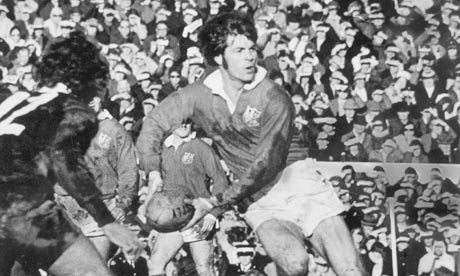
Skinner and Baddiel used to do a bit on their Fantasy Football show, of blessed memory, where they played a newsreel clip of some ancient FA Cup final, consisting of a few seconds of staccato action punctuated by frequent cutaways of cheering chaps in flat caps (up until 1955 it was illegal to try to enter Wembley without a flat cap), wielding those huge old wooden-pronged rattles, which often boasted more teeth than the wielders – and usually less yellow too.
The feature, as I recall, was called Old Football Is Rubbish, a proposition it was impossible to argue with on the basis of the evidence provided. You would not say similar about old rugby union, though, not in a week when the most enjoyable action by some distance was 40 years old. BBC Wales's elegiac memoir of the British and Irish Lions' triumphant 1971 tour of New Zealand, written and presented by my colleague Eddie Butler, acted as a delightful counterpoint to a less than vintage World Cup (I lost count of the number of times commentator Nick Mullins told us "It's not pretty," the final one appearing 10 minutes from the end of yesterday's final).
The footage from provincial matches on the 1971 tour, generous chunks of which appeared alongside more familiar sequences from the four Test matches against the All Blacks, was pretty, but did make one wonder whether those magical black and white images of Barry John, Gareth Edwards, Mike Gibson, Gerald Davies et al in full attacking flow were just the television equivalent of what Barbra Streisand called "misty water-coloured memories" (not referring to the Lions' tour, as it happens, but to some stuff with Robert Redford in the film The Way We Were).
"Can it be it was all so simple then, or has time rewritten every line?" I felt moved to ask my wife, who suggested I go to bed. The Lions' series victory, by two games to one with one drawn, remains their solitary triumph on New Zealand soil, an outcome as unexpected as it was exciting. "Touring New Zealand is an exercise in being crushed," said Eddie, and when the Lions lost a warm-up match on the way out in Queensland, and the Aussie press dubbed them the weakest Lions touring party ever, it looked as though it might be business as usual. But the Lions confounded the critics with a series of wins against club sides in New Zealand before facing Canterbury in a match notable for "kicking, punching, gouging, and fighting" (something for everybody, then) according to Eddie, and likened by reporters to the Battle of Passchendaele.
The brutality saw three British forwards invalided out of the rest of the tour, despite which the Lions won the following week's Test. In between the action, Eddie – mysteriously rechristened Edward Butler in the credits, rather as the DJ Pete Murray rebranded himself Peter when he shed his disc-spinning straitjacket (kids, ask your dad) to go legit and host talk shows – travelled in the footsteps of the victorious Lions and brought us some ripping travelogue stuff. At various stages of his journey, he met veterans of the defeated All Blacks, many of whom seemed to have spent the intervening years growing moustaches.
Back in Wales, the regulars at Cefneithin rugby club, home of Barry John and the coach Carwyn James, shared memories of getting up in the middle of the night to listen to commentary together in the club house, sitting at a long table laid out as a rugby pitch. James, the coach, was very much the hero of the story. "Complex Carwyn brought simplicity to rugby; weapon of choice: the brain," said Eddie.
Here was a man who palpably refused to panic when his depleted outfit lost the second Test. In modern parlance, he took the positives and encouraged his men to do the same. James was way ahead of his time in that amateur era, studying professional coaching methods at Manchester United and also at Wigan rugby league club – which may have been punishable by death at the time. He coached by encouraging and suggesting, rather than browbeating. James hinted at the vulnerability of New Zealand's Fergie McCormick to Barry John before the third Test. The fly-half's kicks ran the unfortunate full-back ragged and contributed hugely to the Lions' victory. "I thought 'that little prick, he's put another one to the side,'" remembered a rueful McCormick, who never played for his country again.
My only beef with the programme, which I loved so much I watched it all over again on the iPlayer, was that every time we got a punctuating shot of Eddie – sorry, Edward – he was on his laptop. We saw Eddie on his laptop in an airport lounge, in a hotel room, in an empty stadium, and on a tightrope 200 feet above the Waikato River (I may have dreamed that one). Clearly, our man is busy completing some sort of Dickensian magnum opus, or more worryingly the Guardian is demanding even more from its sports boys than I imagined.

